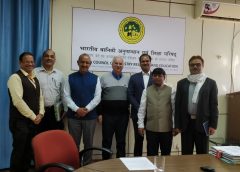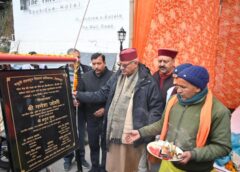Dehradun: Indian Council of Forestry Research and Education (ICFRE), Dehradun and its nine Institutes are actively engaged in the tree improvement programme of forestry tree species to improve yield, quality, resistance and productivity to meet the demand for domestic consumption by industries. In their continued endeavor four Institutes of ICFRE namely Forest Research Institute (FRI) Dehradun, Institute of Forest Genetics and Tree Breeding (IFGTB) Coimbatore, Institute of Forest Productivity (IFP) Ranchi and Arid Forest Research Institute (AFRI) Jodhpur have
developed high yielding clones of important forestry species namely Azadirachta indica (Neem), Calophyllum inophyllum, Eucalyptus hybrid, Dalbergia sissoo and Populus deltoides.
Variety Releasing Committee (VRC) of ICFRE in its meeting on 18 th November 2021 under the Chairmanship of Sh. Subhash Chandra, Director General of Forests & Special Secretary, MoEF&CC, New Delhi granted approval for the release of 22 clones. Forest Research Institute Dehradun has developed six genotypes of Neem for commercial cultivation. These cultivars can produce on an average double the oil and Azadirachtin content in comparison to base population. Institute of Forest Genetic and Tree Breeding, Coimbatore had worked on interspecific hybrids from three different species namely Eucalyptus tereticornis, E. camaldulensis and E. grandis and developed two clones of Eucalyptus Hybrids having growth superiority of more than 10 % over and above the best clone of IFGTB Coimbatore. Six clones of Calophyllum inophyllum valued for its fruit and oil content are also developed by IFGTB Coimbatore for commercial cultivation in Southern States, which can give on an average upto 6 kg average fruit yield/tree after 6 th year of planting compared to 4.3 kg from unimproved seed source. Similarly, three clones of Dalbergia sissoo consistently giving high timber yield are developed by Arid Forest Research Institute Jodhpur for Gujarat. The expected yield of total wood from these Dalbergia sissoo clones is 284.0 Cum/ha in 25 years, from which total income of Rs 29.40 lakhs/ha/25years can be generated as merchantable logs.
Additional income can be obtained from minor timber & fuelwood of Dalbergia sissoo clones. To meet the demand of quality planting material of poplar in Bihar, poplar clonal development programme was initiated by IFP Ranchi and five clones with high productivity and short rotation period are developed by IFP Ranchi for Bihar. These poplar clones have 36.72 to 43.11 m 3 /ha/year productivity, which can give income of 3.21 to 3.77 lakh /ha/year. These poplar clones have outperformed over the well known industrial clone being used at present. In the meeting Sh. A.S. Rawat, Director General, ICFRE and the Co-Chairperson of VRC S.D. Sharma, Member Secretary, VRC, Subject matter experts Dr. Sanjeev Thakur, Dr. B.S Tyagi, Vaidyanathan Hariharan, Dr. D. N. Pandey, PCCF & HoFF Rajasthan and K.P. Dubey, PCCF (R&T), Uttar Pradesh, Directors of the ICFRE Institutes, who are also Chairma of respective RVTC along with the Principal Investigators of the developed clones were present.



